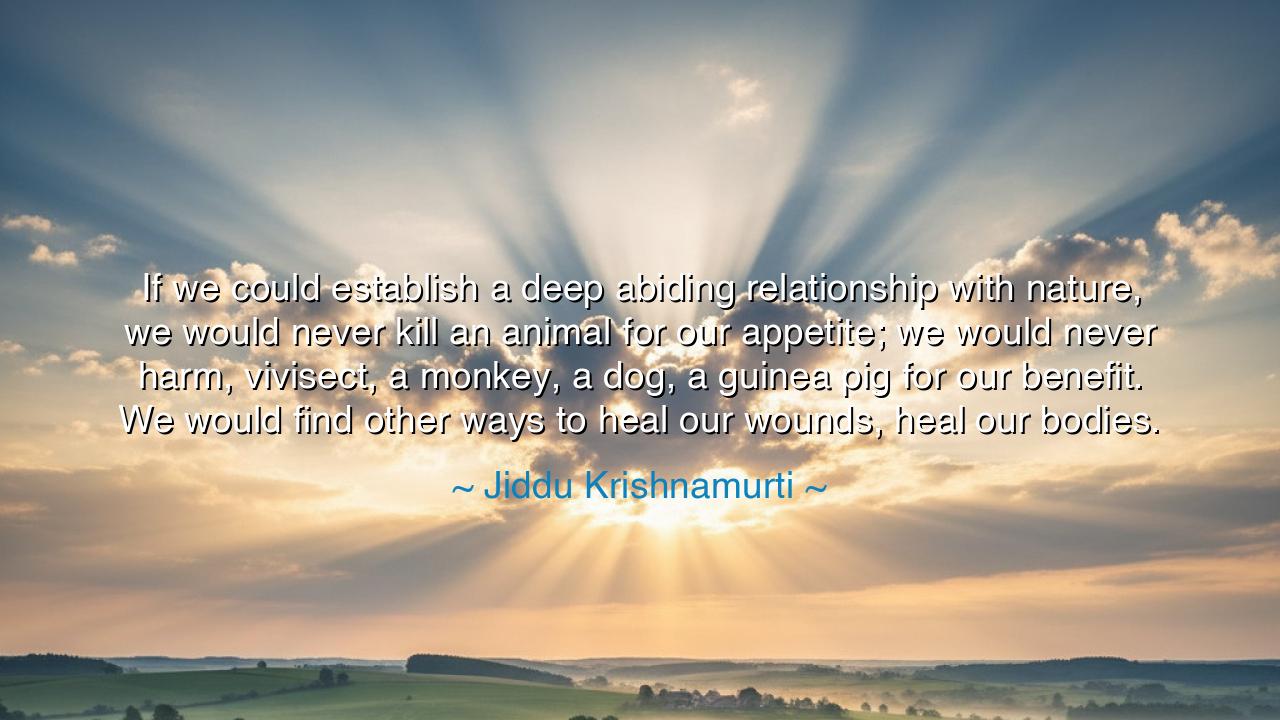
If we could establish a deep abiding relationship with nature
If we could establish a deep abiding relationship with nature, we would never kill an animal for our appetite; we would never harm, vivisect, a monkey, a dog, a guinea pig for our benefit. We would find other ways to heal our wounds, heal our bodies.






When Jiddu Krishnamurti declares, “If we could establish a deep abiding relationship with nature, we would never kill an animal for our appetite; we would never harm, vivisect, a monkey, a dog, a guinea pig for our benefit. We would find other ways to heal our wounds, heal our bodies,” he speaks as a seer of the eternal bond between man and creation. His words remind us that true reverence for nature transforms our actions, softening the hand that harms and awakening the heart to compassion.
The origin of this wisdom lies in Krishnamurti’s lifelong teaching, which sought to free humanity from violence, ignorance, and separation. He saw clearly that man, estranged from nature, becomes cruel, treating living beings as objects to consume or exploit. But when the relationship is renewed — when man beholds himself as part of the whole — then reverence, not domination, becomes the guiding principle. His words echo the ancient sages who declared that harmony with creation is harmony with the soul.
To speak against killing for appetite and harming for profit is to reveal the moral blindness of a fractured spirit. The one who sees the dog, monkey, or guinea pig only as an instrument for gain has already severed the sacred thread that binds all life together. Krishnamurti insists that such practices are not necessity but failure of imagination, for other ways of healing may be found when guided by respect and wisdom.
His teaching also challenges mankind to look inward. The wound we seek to heal in body may in truth be a wound of the spirit — the alienation from the living world around us. To exploit and destroy in the name of progress is to deepen this wound. Only through compassion, creativity, and humility can man rediscover methods that nurture both himself and the world he inhabits.
Let the generations to come remember: to live in deep relationship with nature is to recognize all life as sacred, bound in one great chain of being. Krishnamurti’s words endure as a call to mercy, teaching that to harm less is to love more, and that in loving the earth and its creatures, man will find the truest way to heal his own soul.






HHihi
I find Krishnamurti's perspective on not harming animals to be thought-provoking. It suggests a more harmonious and ethical approach to living, yet, I can’t help but wonder—how would our lives change if we truly respected nature and all creatures in this way? Would it be sustainable for the modern world, and would we be willing to sacrifice certain comforts for this higher moral standard?
HNnghiem hoang hanh nguyen
Krishnamurti's statement about establishing a deep connection with nature is both beautiful and profound. It makes me wonder—if we truly valued all life, could we overcome the ethical dilemmas surrounding animal testing and factory farming? Do you think people are capable of making such a shift in mindset, or do convenience and tradition outweigh compassion in our society?
ADNguyen An Danh
This quote strikes a chord with me because it makes me question the ethics of using animals for research and food. If we could truly connect with nature, as Krishnamurti suggests, could we find alternative methods for healing and sustenance? But, realistically, can we ever fully abandon the systems we’ve built around animal use, or are we too ingrained in these practices to change easily?
MQTran Nguyen Minh Quan
Jiddu Krishnamurti’s quote makes me reflect deeply on our relationship with nature and animals. It challenges the idea that we need to harm animals for our survival or benefit. But, I wonder—how practical is it for society to adopt this mindset in the face of modern medicine and agriculture? Is it even possible to completely separate ourselves from practices that harm animals, or is it just idealistic thinking?